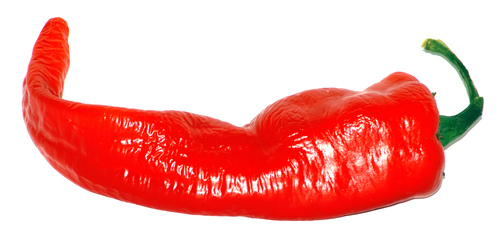Is Capsaicin Bad For You?
Short answer
Capsaicin is far from bad for you. In fact, the compound is very beneficial to your health and offers benefits from weight loss to a reduced risk of prostate cancer.
Very healthy and numerous health benefits. A few harmful qualities may be associated, but only under certain circumstances such as an allergic reaction.
View Full Grading System
Category 'A'
Very healthy and numerous health benefits. Side effects are rare. Things rated an 'A+' are typically necessary for survival (for example, water).
Very healthy and numerous health benefits. A few harmful qualities may be associated, but only under certain circumstances such as an allergic reaction.
Very healthy and numerous health benefits. Harmful qualities may be associated, but aren't usually serious.
It is important to note that even the best things in life can become bad in immoderate amounts. So, although something may be rated an 'A+', overconsumption/overdoing can bring unwanted effects.
Category 'B'
Very beneficial to your health. Things rated a 'B+' may have a few harmful qualities to pay attention to.
Overall beneficial to your health. Things rated a 'B' may have some harmful qualities to pay attention to.
More beneficial to your health than not. However, harmful qualities are most likely associated and shouldn't be overlooked.
The main difference between category 'A' and category 'B' is the harmful qualities typically present in 'B' items. Serious side effects are usually uncommon, but are still possible and should be taken note of.
Category 'C'
Both beneficial and harmful qualities associated. Things rated a 'C+' are typically a bit more on the beneficial side. Still, moderation is important.
A fairly even ratio of beneficial and harmful qualities. Moderation is important. Very general topics that can lean towards both sides of the spectrum will be placed here as well. Rice, for example, can be good or bad depending on the type.
More harmful than beneficial. Side effects are common, especially when consumed/done excessively. Moderation is very important.
Category 'C' usually denotes to both good and bad qualities. When it comes to this category, it is important to keep this word in mind: moderation.
Category 'D'
Harmful to your health. Although benefits may be associated, the bad most likely outweighs the good. Moderation is very important.
Harmful to your health. A few benefits may be associated, but the bad outweighs the good. Moderation is extremely important.
Harmful to your health. Very few, if any, benefits are present. Things in this category should be avoided as much as possible.
Category 'D' is typically for things that are more harmful than beneficial. While consuming/doing something unhealthy once in a blue moon shouldn't hurt, we definitely recommend eliminating 'D' items as a regular part of your routine/diet.
Category 'F'
Category 'F' is for things that fail to bring anything beneficial to the table, and are very harmful to your health. We recommend completely avoiding anything in this category. Long-term side effects of 'F' items are usually very serious.
Category 'N'
'N' stands for neutral. Things placed into this category are generally (a) neither good nor bad for you, or (b) lack the necessary evidence to reach any conclusions.
Long answer
Capsaicin is the active ingredient in chili peppers responsible for both the burning, spicy flavor and array of health benefits. Capsaicin mostly lives in the seeds and ribs of the peppers and its spiciness is measured in Scoville units. Your tolerance to capsaicin builds over time, so if you begin with less spicy peppers, you can work your way up.
Consuming too much capsaicin can cause diarrhea and some other minor effects from the spiciness such as tearing eyes and runny nose, a burning sensation in the mouth, sweating, and flushing of the skin. These are such minor effects and are totally worth the burn for many!
Capsaicin does have a number of beneficial health effects, though, that far outweigh the temporary burn of spice. It can reduce and fight inflammation, reduce swelling and pain, boost the immune system, improve cardiovascular health, and fights cancer cells.
Its use as an anti-inflammatory is one of capsaicin’s best known. Inflammation is reduced because capsaicin inhibits substance P (SP). SP is a neuropeptide that causes irritation and inflammation in epithelial cells and in the immune system, and leads to inflammatory diseases of the respiratory, digestive, and musculoskeletal systems. Capsaicin also reduces pain and swelling. It can often be found in topical products to relieve these symptoms, like those used for arthritis and diabetic neuropathy.
Capsaicin can have benefits in cardiovascular health as well. Not only does it decrease cholesterol levels, but it can also reduce platelet aggregation and dissolve fibrin which together form plaque in the arteries that can break free and cause embolisms. This also leads to less atherosclerosis formation.
One particular interesting effect of capsaicin is its ability to stop the spread of cancer cells - specifically prostate cancer cells. The form of testosterone that activates Prostate-Specific Antigen (PSA) is also inhibited causing the levels of PSA to drop.
Lastly, the same spiciness that causes your eyes to weep and nose and mouth to burn also clears congestion and causes a thermogenic reaction in your body. This thermogenic agent means increased metabolism or, in other words, everyone’s favorite mechanism – fat burning. Many supplements that claim to burn fat contain capsaicin, but eating a few flavorful, spicy peppers sounds way better!
Possible short-term side effects
- diarrhea
-
sweating
-
burning mouth
-
runny eyes and nose
-
flushed skin
Benefits
- boosts immune system
-
decreases pain and swelling
-
anti-inflammatory
-
antibacterial
-
reduces prostate cancer risk
-
promotes weight loss
Please turn your Ad Blocker off to see this content. Thank you!
Thank you for your feedback!
Written by Kristin Brown, DC, MS
Published on: 07-19-2016
Last updated: 12-10-2016
Thank you for your feedback!
Written by Kristin Brown, DC, MS
Published on: 07-19-2016
Last updated: 12-10-2016


 Approved by
Approved by 














